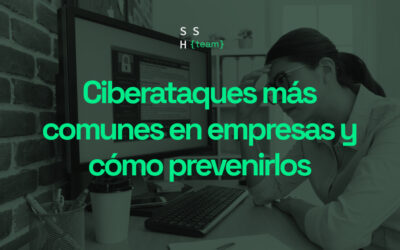En verano es usual que aumenten los ciberataques a las empresas. En 2023 aumentaron un 30% en comparación con los meses de invierno y primavera, poniendo en riesgo la seguridad empresarial. Pero esto, ¿a qué se debe? En este artículo expondremos los factores que más influyen para que los cibercriminales aumenten su actividad en estos meses y cómo mantener la seguridad de tu empresa en verano.
Factores que contribuyen al aumento de ciberataques en verano
En verano los trabajadores están más dispersos y los ciberdelincuentes lo saben y aprovechan esta vulnerabilidad para poder acceder a cierta información de las empresas, ya sea mediante phishing u otras técnicas de ingeniería social.
Las vacaciones de verano hacen que las empresas tengan menos personal, lo que conlleva que los empleados tengan que cubrir tareas para las que están menos especializados y se cometan errores de factor humano. Si los técnicos de seguridad se cogen vacaciones, es importante tener la capacidad para cubrir ese puesto de manera efectiva, ya que los cibercriminales suelen aprovechar la situación para realizar ciberataques.
Además, es un periodo dónde los empleados, al irse de vacaciones o teletrabajar, suelen conectarse a redes externas poco seguras y si tienen datos sobre la empresa en el dispositivo móvil, los ciberdelincuentes podrían acceder a ellos.
Consejos para proteger la seguridad de tu empresa en verano
Desarrolla un Plan de Ciberseguridad.
Lo primero sería elaborar un plan de ciberseguridad específico para la temporada de verano y vacaciones, dónde se tenga en cuenta las posibles vulnerabilidades que hay.
Monitorización continua de vulnerabilidades.
Puedes y debes monitorizar en tiempo real las amenazas mediante un SOC. Este servicio lo puedes externalizar y encargar a otra empresa especializada en ciberseguridad, de manera que pueda controlar las amenazas 24/7. En SSH Team ofrecemos este servicio a través de un producto de desarrollo propio llamado totalsoc.io, el cual abarca detección de amenazas, señuelos, alertas y notificaciones.
Incrementa las auditorías de seguridad.
Durante los meses de verano es esencial realizar comprobaciones periódicas para ver que no existen vulnerabilidades. En los meses de verano estas auditorías se tendrían que realizar de forma más regular.
Forma a los empleados.
Es esencial concienciar sobre los riesgos que pueden correr los dispositivos de los empleados cuando se van de vacaciones. Se debe formar tanto a los empleados que van a estar ausentes como a los que van a tener que cubrir los diferentes puestos, de esta manera aseguraremos la empresa de manera interna y externa.
Proporciona VPN a los empleados.
Los ciberdelincuentes aprovechan las redes públicas poco seguras para conseguir información de las empresas, por lo que es esencial dar herramientas específicas a los empleados para que no pongan en riesgo a la empresa. Asegúrate de que los empleados que están teletrabajando usen VPNs para acceder a la red de la empresa.
Advierte sobre posibles estafas de Phishing.
Los cibercriminales pueden hacerse pasar por compañeros que están de vacaciones, por lo que es esencial avisar de esta práctica y otras comunes como las que veremos ahora para que no caigan tan fácilmente en la trampa.
Las estafas más comunes durante el verano
Ofertas de viajes o incluso vacaciones gratis. ¿A quién no le seducen las promociones durante el verano? Es un periodo en que todos queremos disfrutar al máximo sin gastar los ahorros acumulados durante todo un año. Los ciberdelincuentes lo saben y aprovechan esta vulnerabilidad para mandar emails de phishing ofreciendo ofertas irresistibles que podrían resultar en la pérdida de unas vacaciones reales.
Estafas de alquiler vacacional. Los estafadores también están presentes en los sitios web de alquiler vacacional, por eso hay que tener cuidado y siempre realizar los pagos a través de los sitios web oficiales para que en caso de que haya algún problema, estos puedan hacerse cargo de los daños.
Sitios web clonados. Ya lo hemos dicho un par de veces, pero lo volvemos a recalcar, es muy importante que chequeemos 3, 4 o 5 veces, que las URL a los sitios que accedemos no tienen ningún error en el nombre, que nos haga sospechar que no es el sitio oficial.
Estafas de smishing. Los ciberdelicuentes suplantan a entidades bancarias y nos pueden mandar SMS de un supuesto bloqueo de nuestra tarjeta, por ejemplo. El mayor temor en verano podría ser quedarnos sin fondos, por lo que los ciberdelincuentes se aprovechan de este miedo para enviar este tipo de mensajes de texto.
Falsos códigos QR. Desde la pandemia, es común encontrarnos muchos QR en las terrazas o tiendas para acceder a información específica. Los ciberdelincuentes pueden generar códigos maliciosos que redirigen a páginas fraudulentas haciéndolos pasar como propios del establecimiento. Es fundamental evitarlos siempre que sea posible o verificar que nos lleven a la página correcta.
Redes públicas clonadas. Las redes públicas son un blanco jugoso para los ciberdelincuentes, los cuales pueden clonarlas para acceder a la información de cualquier persona que se conecte. Es mejor evitarlas mientras estamos de vacaciones y sobre todo si nos vamos a conectar a través de un teléfono de empresa que pueda contener información sensible.
Por todo esto es esencial tener un buen plan de acción en ciberseguridad que también tenga en cuenta los peligros estacionales a los que se pueden enfrentar los negocios. Ya es complicado de por sí mantener el ritmo durante las vacaciones de verano como para correr riesgos que podrían tener graves consecuencias.
¿Todavía no dispones de un plan de ciberseguridad? La subvención Activa Ciberseguridad incluye desde una auditoría hasta la elaboración de un plan en ciberseguridad para PYME.
Empieza a proteger tu empresa de las ciberamenazas
Déjanos tus datos y nuestro equipo se pondrá en contacto contigo



